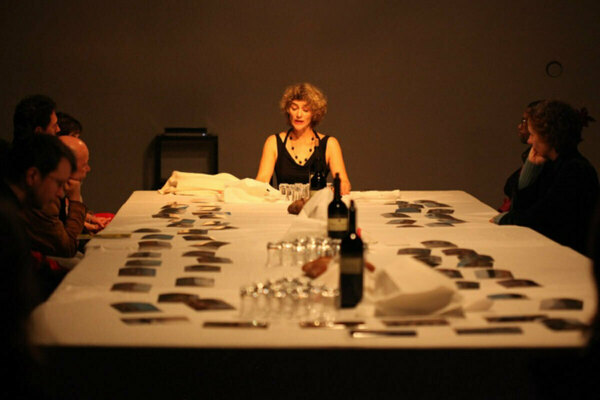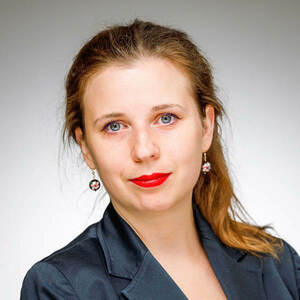
Clyde Chabot, a French playwright, author and artist, will give a series of performances at the University of Notre Dame (in English and in French) on Thursday, March 24, and Friday, March 25, 2022. While visiting several Notre Dame classes this week, she encouraged students to reflect on their identities, where they come from, where they are going; she asked them questions, took their answers, and turned them into a moving collective portrait. The following interview with Sonja Stojanovic, assistant professor of French and Francophone studies and Nanovic faculty fellow, is the opportunity to turn the tables and ask Clyde Chabot some questions inspired by her own questionings.
Sonja Stojanovic: Let’s begin with the first question on the questionnaire you give to students: “Who are you?”
Clyde Chabot: I am a French artist, playwright, artistic director and performer in a theatre company, La Communauté inavouable [The Unavowable community], founded in Paris in 1992.
I am a French woman with Sicilian origins. My ancestors left Sicily at the end of the 19th century, one branch to Tunisia then France in 1956 at the time of independence, and the other to Chicago, USA.
I am a mother who gave birth to my daughter four months early, as if by chance, in Chicago, at the exact place where my ancestors migrated.
Stojanovic: You did not always want to be a playwright. How did you find your way to the theatre?
Chabot: I studied political sciences at the Political Sciences Institute in Paris (Sciences Po), in the public service section. I wanted to “change the world” and better the relations of France with its former colonies in Africa. Then I discovered that the topics about government administration and tax history were very foreign to me. I earned my diploma then decided to study theatre at university, where I completed a Ph.D. on the role of contemporary theatre in society. This was a way to legitimize and justify this change of path in my professional project: to prove to others and myself that theatre was necessary and political.
Stojanovic: How is theatre related to politics or the political for you?
Chabot: Theatre allows people to face together our fragility (mortality, wounds, separation, deceptions…) and this helps us to accept it. Moreover, it contributes to creating contemporary mythologies that constitute society. And it intimately allows us to re-constitute our subjectivity through the impact of various images and symbols on us. Something has moved in us, and then the world is different.
Stojanovic: As you have been traveling around the world to present your work, how have these experiences been translated into your own work?
Chabot: I like to adapt projects to the country where I am with the translation of texts in the local language and by questioning the meaning of the texts in the society in which we are. For instance, the project A Museum (theatre) inspired by the theatre play Hamlet-machine by German author Heiner Müller, which took place in Germany, France, India, Taiwan, Canada, South Korea, Cambodia, Romania, Bosnia, and will take place in Sri Lanka next July, proposes to people to create their own self-portraits by associating pictures from all over the world and from their respective countries, and by juxtaposing to them words extracted from the translated text; a professional photographer then takes their picture. In this way, people create themselves this participative piece of work that is always in flux. The constellation of portraits in each country draws a quite sensitive and political portrait of each of the societies that we have visited.
Stojanovic: You are celebrating the 30th anniversary of your company. How do you go about creating your performances?
Chabot: I do not know yet if I might celebrate it or not! But our website www.inavouable.net gathers traces of all our performances with depictions, photos and videos, and press clippings. And the project A Museum (theatre), which has already lasted for 20 years, presents portraits of the people that represent quite well the communauté inavouable—people who try to express and share who they are in their country.
Stojanovic: Your family is very present in your performances. How did this come about?
Chabot: It was by chance. A friend of mine invited me to go with her to Sicily on vacation as she remembered that I have Sicilian roots; I had almost forgotten it, even if I was passionate about this question when I was a child. As my family tried to integrate into French society when they arrived in the 1950s and to erase their Sicilian culture to fulfill their integration, I finally ended up forgetting my origins myself. But to walk on the ground in Palermo, where my grandmother came from, touched me so deeply. I realized it was the soil of my ancestors and could not keep it quiet.
Stojanovic: The audience has a role in your work—how has this relationship changed over the years?
Chabot: As I did not study theatre at first, but pursued political studies, I was very surprised when someone proposed to me to put together a specific performance on texts by the celebrated French artist Sophie Calle; it took place in hotel suites. The feeling to be alive and connected to others who look at you was so strong that I decided to try to share with the audience not only the experience to be in front of a performance but to be in it. For example, in The Blind by Maëterlinck, the audience sits on tree trunks in the fog; in SICILIA, which I will perform here at Notre Dame three times, the spectators sit around the table as if they were my family scattered in the world that I would try to gather. Or I even propose to visitors to co-create a project as in the installation A Museum (theatre).
Stojanovic: You have been at Notre Dame for a few days now. What is a moment or a place that has stayed with you?
Chabot: I particularly appreciated recreating a kind of collective portrait of a student at Notre Dame nowadays through the answers and testimonies of the French composition students of Fr. Gregory Haake, C.S.C., and during the Café français. I’ve also enjoyed seeing the students performing the texts I have put together.
Stojanovic: What’s next for you?
Chabot: Another A Museum (theatre) project, this time in Sri Lanka, and a new creation where I will be involved as both an actress and a dancer. The text is about my wallet that has been stolen from my purse in Marseille in the South of France, and through this, once again, I question my identity on the shores of the Mediterranean Sea. I also have two projects with high school students with the same questions that I have asked to the students at Notre Dame.
Stojanovic: Let’s end with the last question on your questionnaire: “What is magical about existence?”
Chabot: What is magical is to be here today after two years of preparations and despite the Covid crisis, to be here with you, who worked so hard to make this project possible with the financial support of various institutes, and with the professors and students.
Stojanovic: Merci, Clyde!
Please note: Clyde Chabot's performances of SICILIA and TUNISIA at the University of Notre Dame on March 24 & 25 are free, but tickets must be reserved in advance.
The organizers gratefully acknowledge the financial support of the following University of Notre Dame units: The Teaching Beyond the Classroom Mid-Size Grant and the Henkels Mini-Conference Fund, Institute for Scholarship in the Liberal Arts (College of Arts and Letters), and the Nanovic Institute for European Studies (Keough School of Global Affairs).
The event is co-sponsored by Institut Français, Villa Albertine, Consulat Général de France à Atlanta, Emory University, SPEDIDAM, Département Essonne, Région Île de France, Ville de Lisses, Saint Denis, and Fundraising Conseil.
About the author

Sonja Stojanovic is Assistant Professor of French and Francophone Studies at the University of Notre Dame, specializing in 20th- and 21st-century French and Francophone literatures. She is the author of Mind the Ghost: Thinking Memory and the Untimely through Contemporary Fiction in French (forthcoming with Liverpool University Press) and the co-editor of ‘Taking Up Space’: Women at Work in Contemporary France (forthcoming with the University of Wales Press). Stojanovic is a faculty fellow of the Nanovic Institute for European Studies and of the Kellogg Institute for International Studies, and a concurrent faculty in the Gender Studies Program.
Originally published by at nanovic.nd.edu on March 24, 2022.